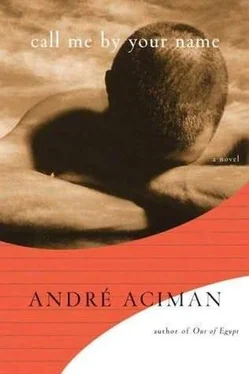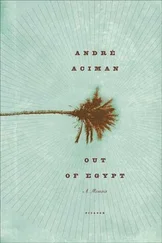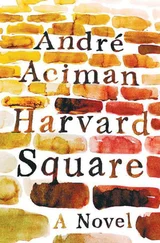André Aciman - Call Me by Your Name
Здесь есть возможность читать онлайн «André Aciman - Call Me by Your Name» весь текст электронной книги совершенно бесплатно (целиком полную версию без сокращений). В некоторых случаях можно слушать аудио, скачать через торрент в формате fb2 и присутствует краткое содержание. Год выпуска: 2007, Издательство: Farrar, Straus and Giroux, Жанр: Современная проза, на английском языке. Описание произведения, (предисловие) а так же отзывы посетителей доступны на портале библиотеки ЛибКат.
- Название:Call Me by Your Name
- Автор:
- Издательство:Farrar, Straus and Giroux
- Жанр:
- Год:2007
- ISBN:нет данных
- Рейтинг книги:5 / 5. Голосов: 6
-
Избранное:Добавить в избранное
- Отзывы:
-
Ваша оценка:
- 100
- 1
- 2
- 3
- 4
- 5
Call Me by Your Name: краткое содержание, описание и аннотация
Предлагаем к чтению аннотацию, описание, краткое содержание или предисловие (зависит от того, что написал сам автор книги «Call Me by Your Name»). Если вы не нашли необходимую информацию о книге — напишите в комментариях, мы постараемся отыскать её.
is clear-eyed, bare-knuckled, and ultimately unforgettable.
Call Me by Your Name — читать онлайн бесплатно полную книгу (весь текст) целиком
Ниже представлен текст книги, разбитый по страницам. Система сохранения места последней прочитанной страницы, позволяет с удобством читать онлайн бесплатно книгу «Call Me by Your Name», без необходимости каждый раз заново искать на чём Вы остановились. Поставьте закладку, и сможете в любой момент перейти на страницу, на которой закончили чтение.
Интервал:
Закладка:
I caught my father staring at me as I finished slicing off the tip of his second soft-boiled egg.
“Americans never know how to do it,” I said.
“I am sure they have their way…,” he said.
The foot that came to rest on mine under the table told me that perhaps I should let it go and assume my father was onto something. “He’s no fool,” he said to me later that morning as he was getting ready to head up to B.
“Want me to come with?”
“No, better keep a low profile. You should work on your Haydn today. Later.”
“Later.”
Marzia called that morning while he was getting ready to leave. He almost winked when he handed me the telephone. There was no hint of irony, nothing that didn’t remind me, unless I was mistaken — and I don’t think I was — that what we had between us was the total transparency that exists among friends only.
Perhaps we were friends first and lovers second.
But then perhaps this is what lovers are.

When I think back to our last ten days together, I see an early-morning swim, our lazy breakfasts, the ride up to town, work in the garden, lunches, our afternoon naps, more work in the afternoon, tennis maybe, after-dinners in the piazzetta, and every night the kind of lovemaking that can run circles around time. Looking back to these days, I don’t think there was ever a minute, other than the half hour or so he spent with his translator, or when I managed to steal a few hours with Marzia, when we weren’t together.
“When did you know about me?” I asked him one day. I was hoping he’d say, When I squeezed your shoulder and you almost wilted in my arms. Or, When you got wet under your bathing suit that one afternoon when we chatted in your room. Something along those lines. “When you blushed,” he said. “Me?” We had been talking about translating poetry; it was early in the morning, during his very first week with us. We had started working earlier than usual that day, probably because we already enjoyed our spontaneous conversations while the breakfast table was being laid out under the linden tree and were eager to spend some time together. He’d asked me if I’d ever translated poetry. I said I had. Why, had he? Yes. He was reading Leopardi and had landed on a few verses that were impossible to translate. We had been speaking back and forth, neither of us realizing how far a conversation started on the fly could go, because all the while delving deeper into Leopardi’s world, we were also finding occasional side alleys where our natural sense of humor and our love for clowning were given free play. We translated the passage into English, then from English to ancient Greek, then back to gobbledygenglish to gobbledygitalian. Leopardi’s closing lines of “To the Moon” were so warped that it brought bursts of laughter as we kept repeating the nonsense lines in Italian — when suddenly there was a moment of silence, and when I looked up at him he was staring at me point-blank, that icy, glassy look of his which always disconcerted me. I was struggling to say something, and when he asked how I knew so many things, I had the presence of mind to say something about being a professor’s son. I was not always eager to show off my knowledge, especially with someone who could so easily intimidate me. I had nothing to fight back with, nothing to add, nothing to throw in to muddy the waters between us, nowhere to hide or run for cover. I felt as exposed as a stranded lamb on the dry, waterless plains of the Serengeti.
The staring was no longer part of the conversation, or even of the fooling around with translation; it had superseded it and become its own subject, except that neither dared nor wanted to bring it up. And yes, there was such a luster in his eyes that I had to look away, and when I looked back at him, his gaze hadn’t moved and was still focused on my face, as if to say, So you looked away and you’ve come back, will you be looking away again soon? — which was why I had to look away once more, as if immersed in thought, yet all the while scrambling for something to say, the way a fish struggles for water in a muddied pond that’s fast drying up in the heat. He must have known exactly what I was feeling. What made me blush in the end was not the natural embarrassment of the moment when I could tell he’d caught me trying to hold his gaze only then to let mine scamper to safety; what made me blush was the thrilling possibility, unbelievable as I wanted it to remain, that he might actually like me, and that he liked me in just the way I liked him.
For weeks I had mistaken his stare for barefaced hostility. I was wide of the mark. It was simply a shy man’s way of holding someone else’s gaze.
We were, it finally dawned on me, the two shyest persons in the world.
My father was the only one who had seen through him from the very start.
“Do you like Leopardi?” I asked, to break the silence, but also to suggest that it was the topic of Leopardi that had caused me to seem somewhat distracted during a pause in our conversation.
“Yes, very much.”
“I like him very much too.”
I’d always known I wasn’t speaking about Leopardi. The question was, did he?
“I knew I was making you uncomfortable, but I just had to make sure.”
“So you knew all this time?”
“Let’s say I was pretty sure.”
In other words, it had started just days after his arrival. Had everything since been pretense, then? And all these swings between friendship and indifference — what were they? His and my ways of keeping stealthy tabs on each other while disclaiming that we were? Or were they simply as cunning a way as any to stave each other off, hoping that what we felt was indeed genuine indifference?
“Why didn’t you give me a sign?” I said.
“I did. At least I tried.”
“When?”
“After tennis once. I touched you. Just as a way of showing I liked you. The way you reacted made me feel I’d almost molested you. I decided to keep my distance.”
Our best moments were in the afternoon. After lunch, I’d go upstairs for a nap just when coffee was about to be served. Then, when the lunch guests had left, or slunk away to rest in the guesthouse, my father would either retire to his study or steal a nap with my mother. By two in the afternoon, an intense silence would settle over the house, over the world it seemed, interrupted here and there either by the cooing of doves or by Anchise’s hammer when he worked on his tools and was trying not to make too much noise. I liked hearing him at work in the afternoon, and even when his occasional banging or sawing woke me up, or when the knife grinder would start his whetstone running every Wednesday afternoon, it left me feeling as restful and at peace with the world as I would feel years later on hearing a distant foghorn off Cape Cod in the middle of the night. Oliver liked to keep the windows and shutters wide open in the afternoon, with just the swelling sheer curtains between us and life beyond, because it was a “crime” to block away so much sunlight and keep such a landscape from view, especially when you didn’t have it all life long, he said. Then the rolling fields of the valley leading up to the hills seemed to sit in a rising mist of olive green: sunflowers, grapevines, swatches of lavender, and those squat and humble olive trees stooping like gnarled, aged scarecrows gawking through our window as we lay naked on my bed, the smell of his sweat, which was the smell of my sweat, and next to me my man-woman whose man-woman I was, and all around us Mafalda’s chamomile-scented laundry detergent, which was the scent of the torrid afternoon world of our house.
Читать дальшеИнтервал:
Закладка:
Похожие книги на «Call Me by Your Name»
Представляем Вашему вниманию похожие книги на «Call Me by Your Name» списком для выбора. Мы отобрали схожую по названию и смыслу литературу в надежде предоставить читателям больше вариантов отыскать новые, интересные, ещё непрочитанные произведения.
Обсуждение, отзывы о книге «Call Me by Your Name» и просто собственные мнения читателей. Оставьте ваши комментарии, напишите, что Вы думаете о произведении, его смысле или главных героях. Укажите что конкретно понравилось, а что нет, и почему Вы так считаете.









